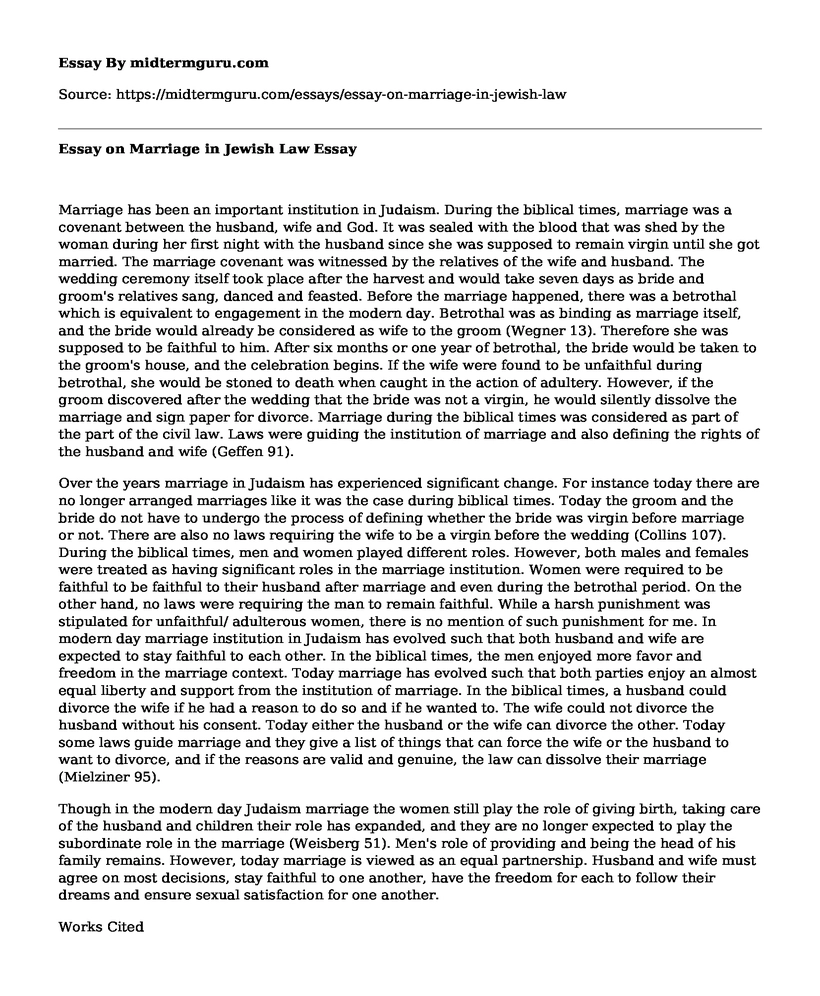Marriage has been an important institution in Judaism. During the biblical times, marriage was a covenant between the husband, wife and God. It was sealed with the blood that was shed by the woman during her first night with the husband since she was supposed to remain virgin until she got married. The marriage covenant was witnessed by the relatives of the wife and husband. The wedding ceremony itself took place after the harvest and would take seven days as bride and groom's relatives sang, danced and feasted. Before the marriage happened, there was a betrothal which is equivalent to engagement in the modern day. Betrothal was as binding as marriage itself, and the bride would already be considered as wife to the groom (Wegner 13). Therefore she was supposed to be faithful to him. After six months or one year of betrothal, the bride would be taken to the groom's house, and the celebration begins. If the wife were found to be unfaithful during betrothal, she would be stoned to death when caught in the action of adultery. However, if the groom discovered after the wedding that the bride was not a virgin, he would silently dissolve the marriage and sign paper for divorce. Marriage during the biblical times was considered as part of the part of the civil law. Laws were guiding the institution of marriage and also defining the rights of the husband and wife (Geffen 91).
Over the years marriage in Judaism has experienced significant change. For instance today there are no longer arranged marriages like it was the case during biblical times. Today the groom and the bride do not have to undergo the process of defining whether the bride was virgin before marriage or not. There are also no laws requiring the wife to be a virgin before the wedding (Collins 107). During the biblical times, men and women played different roles. However, both males and females were treated as having significant roles in the marriage institution. Women were required to be faithful to be faithful to their husband after marriage and even during the betrothal period. On the other hand, no laws were requiring the man to remain faithful. While a harsh punishment was stipulated for unfaithful/ adulterous women, there is no mention of such punishment for me. In modern day marriage institution in Judaism has evolved such that both husband and wife are expected to stay faithful to each other. In the biblical times, the men enjoyed more favor and freedom in the marriage context. Today marriage has evolved such that both parties enjoy an almost equal liberty and support from the institution of marriage. In the biblical times, a husband could divorce the wife if he had a reason to do so and if he wanted to. The wife could not divorce the husband without his consent. Today either the husband or the wife can divorce the other. Today some laws guide marriage and they give a list of things that can force the wife or the husband to want to divorce, and if the reasons are valid and genuine, the law can dissolve their marriage (Mielziner 95).
Though in the modern day Judaism marriage the women still play the role of giving birth, taking care of the husband and children their role has expanded, and they are no longer expected to play the subordinate role in the marriage (Weisberg 51). Men's role of providing and being the head of his family remains. However, today marriage is viewed as an equal partnership. Husband and wife must agree on most decisions, stay faithful to one another, have the freedom for each to follow their dreams and ensure sexual satisfaction for one another.
Works Cited
Collins, John J. "Marriage, divorce, and family in the second Temple Judaism." Families in Ancient Israel (1997): 104-62.
Geffen, Rela M. Celebration & Renewal: Rites of Passage in Judaism. Philadelphia: Jewish Publication Society, 1993. Print.
Mielziner, Moses. The Jewish Law of Marriage and Divorce in Ancient and Modern Times: And Its Relation to the Law of the State. Bloch publishing and printing Company, 1884.
Wegner, Judith Romney. "Status of Women in Jewish and Islamic Marriage and Divorce Law, The." Harv. Women's LJ 5 (1982): 1.
Weisberg, Dvora E. Levirate marriage and the family in ancient Judaism. UPNE, 2009.
Cite this page
Essay on Marriage in Jewish Law. (2021, May 26). Retrieved from https://midtermguru.com/essays/essay-on-marriage-in-jewish-law
If you are the original author of this essay and no longer wish to have it published on the midtermguru.com website, please click below to request its removal:
- The Primary Christian Texts - Paper Example
- The Pilgrim's Progress - Critical Essay Sample
- Law Enforcement Agencies Evolve to Combat Crime in Changing Society - Research Paper
- Twixters & Kiddults: Young Men Relying on Parents in Modern Society - Research Paper
- Essay Sample on Social Impact on Quality of Life
- The Changing Dynamics of Business: Globalization, Society & Regulation - Essay Sample
- Serving Humanity: A Call to All - Essay Sample







